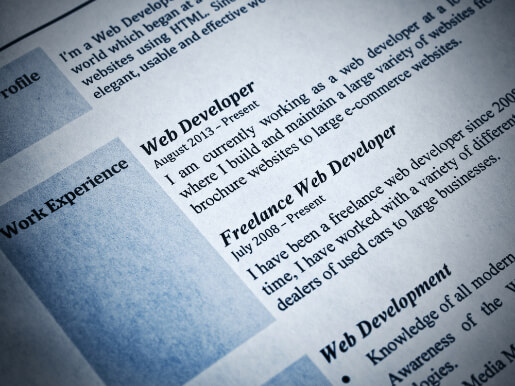How to Craft The Perfect Web Developer Resume

How to Craft The Perfect Web Developer Resume
When you're ready to move to the next step in your web developer career, are you doing the right things to ensure that you get the attention you want and deserve? Are you just putting down the perfunctory information and sending it off into the world? As much as we would like to think that web developers are highly sought after, the truth is that things are getting more and more competitive, and the only way to ensure that you have a real shot at those good-paying jobs is to spend time on your resume to make sure that it is enticing and makes leads want to know more about you. Each step in the process is important, but you’re not going to get anywhere with a blasé resume. Here are some great tips to make your resume shine.
Why Do Web Developers Need a Resume?
You know that you are a great web developer, but you may want to look for a better situation than what you have now. If you are freelance, you might be getting tired of doing the legwork to sign new clients, and maybe finding new clients hasn't gotten any easier. Or you might have a decent corporate job, but know that you are worth more than your current salary. How do you tell that to the person next to you? How do you do it in the space of a single page? Having a solid resume will go a long way in making sure that you will secure the next set of jobs you are looking for. Competition has gotten tighter for web developers, and that only looks to be getting tighter in the future.

What is in a Web Developer Resume?
Learn the essential pieces to your resume
Writing A Professional Summary?
Often at the top of the resume is a ‘professional summary’ or the ‘career objective.’ If you’re a new web developer, you would use this space to outline your qualifications, enthusiasm for the industry, and what you can bring to the company. At this point, you have little to no experience to draw from, so your best option is to ooze energy and a willingness to tackle any project that might come your way.
For those that have several years of experience, this spot will turn into a professional summary instead of a career objective. Don't use this space to talk about you, but rather highlight your contributions to your past employer(s). Did you streamline an eCommerce site to make it easier for customers to order? Have you won any awards for your work? Stats and data really help here, as it highlights your accomplishments that are objective vs. subjective. The idea is to pull the reader further into your resume because you impressed them with the summary.
Related: Learn how your military background can give you credit
How to Describe Your Skills?
You have plenty of skills related to your work and career, and this the section to highlight those skills. These wouldn’t have appeared in your professional summary as that isn't the place for these. Review what the job position lists for skills and tailor your skills list to those. If it makes sense, you can categorize your skills, such as languages you've used together.
When putting together your list of skills, be sure that only the ones that you are either good at or exceptional at get put into the skills section on your resume. You might know about that one thing, but just knowing about it isn't doing anyone any good; you need to have experience with it to have it in your skills section.
Talking About Your Experience
When you discuss your experience on your resume, this is the perfect time to address the job description points. Look at what words are used in the job description and what skills they are requesting. Then you can match up your experience with these skills and words. Maybe it's obvious, but the point of this part of your resume is to make sure that you can match up your experiences with the job requirements. Keep it relevant, detailed, and if you have numbers to back up the details, even better. You are trying to show that you have the skills and experience that they are looking for and make them want to bring you in for an in-person interview.
Related: Get yourself up to speed with web development
Wanting to know more about Sabio? Plan to attend one of the upcoming informational events
Education
Often the education section of a resume can seem blah and just regurgitating facts. Things like the degree you earned, the dates you attended, the school's location, and more are good and deserve to be there. But you can add to this to help make your educational career stand out more. What activities did you pursue outside of class that match up with your degree and experiences? What about any achievements you made while you were at school? This is a chance to tell a small story using some action words to detail these achievements and pursuits. This again gives you an edge that helps you stand out from the crowd.
Who Can Guide You on Creating a Web Developer Resume That Will Score You An Interview?
When you are ready to put everything together for your resume, Sabio will be there to help you craft the best resume to get the best results. They have alumni of their program that are making six figures not long after graduating, and they can help do the same for you. Whether you have ambitions of working for Amazon, Google, or any other high tech firm, Sabio provides not only the education you need but also support to their graduates to help ensure that they put their best foot forward, including making sure their resume is a standout document that employers take notice of.
Related: See the success stories of recent graduates
Conclusion
When putting together your resume, don't just put the facts down and think that you'll have job offers lined up around the block. Competition from other qualified candidates means that you need to add the extra effort to emerge from the masses and show why employers need to pay attention to you. Matching your skills to the job description, adding notes about your educational achievements and pursuits, and putting forward a great professional summary will help ensure that you get noticed. Don't make the mistake so many others do and just slap information on a sheet and call it good. Get the attention you deserve with a powerful resume.
Are you ready to get started on a great new career? Fill out the application to get things rolling!
Posts you might like
- Navigating the Tech Job Market: Insights from Sabio Alumni and Cybersecurity Opportunities
- Embracing the Climb: A Leader's Growth Mindset Journey
- This is the Perfect Time to Dive into Coding and Automation, This is Why!
- Troubleshoot Like a Pro: The Art of Debugging in Programming
- Beyond Bootcamp: Diverse Career Avenues in Tech
- Spotting Burnout in Tech Job Hunts: 6 Warning Signs & Ways to Overcome It
- Get Hired: Essential Knowledge for Emerging Programmers
- 7 Steps to Build a Personalized Continuous Learning Plan for Coders
- Empower Your Journey: Benefits of Remote Code Bootcamps
- Proactive Steps: Daily Rituals for the Job-Hunting Programmer
- Don't Sabotage Your Tech Job Search: Mistakes to Skip
- Unleashing Opportunities: How Bootcamp Career Services Propel Success
- From Lines to Offers: How Your Coding Experience Shapes Market Value
- Optimizing Success: Your Attitude in Coding Bootcamps
- Roadmap to Success: Tech Job Hunt with a Coding Bootcamp Mentor
- Crafting Your Tech Startup Roadmap from Bootcamp Grad
- Tips for Creating a Resume That Gets Interviews for High-Experience Jobs After Coding Bootcamp
- Accelerate Your Career: Embrace Bootcamps for Real-World Programming Skills
- The Coding Craft: Essential Skills Learned at Bootcamps
- Bootcamp Bonds: Tapping into Networks for Tech Employment
- Coding Confidence Booster: The Benefits of Coding Mock Interviews
- Programming by the Clock: The Impact of Effective Time Management
- Coding Freedom: The Value of Learning at Your Own Speed
- Calm Code Journey: Overwhelm-Free Bootcamp Success
- Polish Your Pitch: Tech Interview Communication Essentials
- Inside the Loop: Coding Bootcamps and Tech Industry Strategies
- From Zero to Hired: Decode the Experience Question in Tech Interviews
- Solving the Puzzle: Refining Your Problem-Solving as a Programmer
- The Art of Practicality: Using Coding Languages Without Overlearning
- Practice Makes Perfect: The Key to Software Engineering Brilliance



